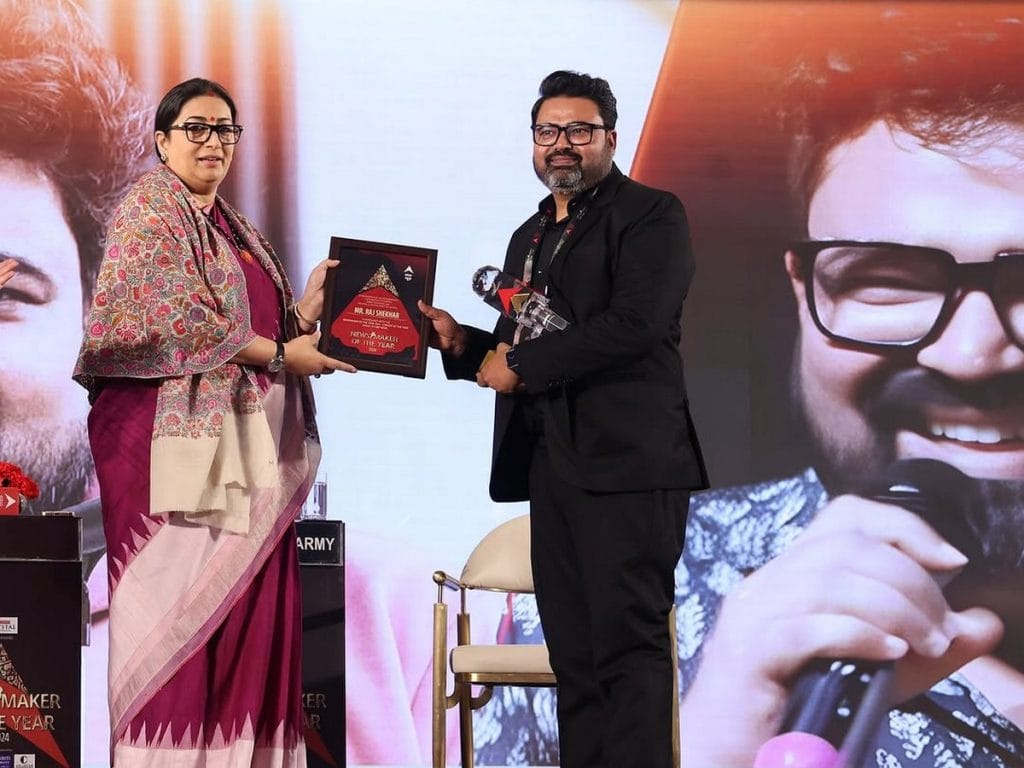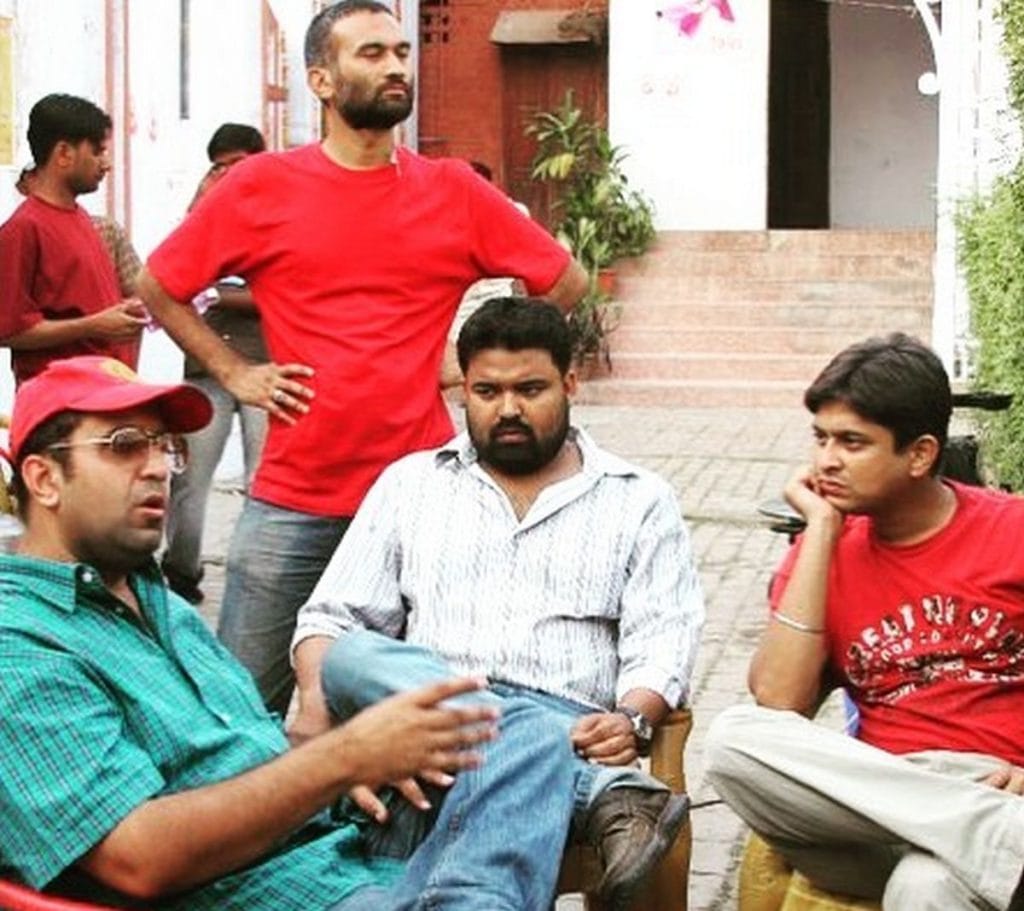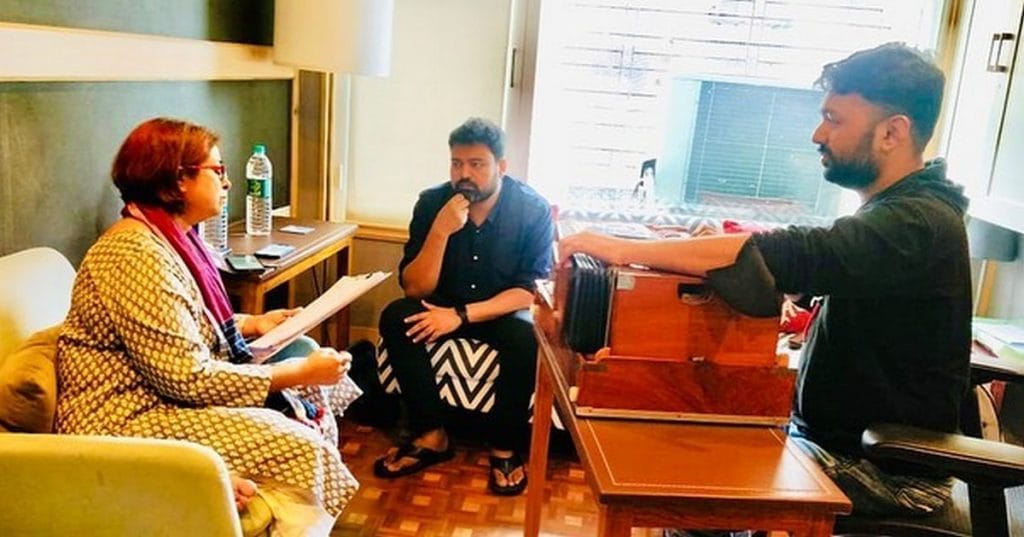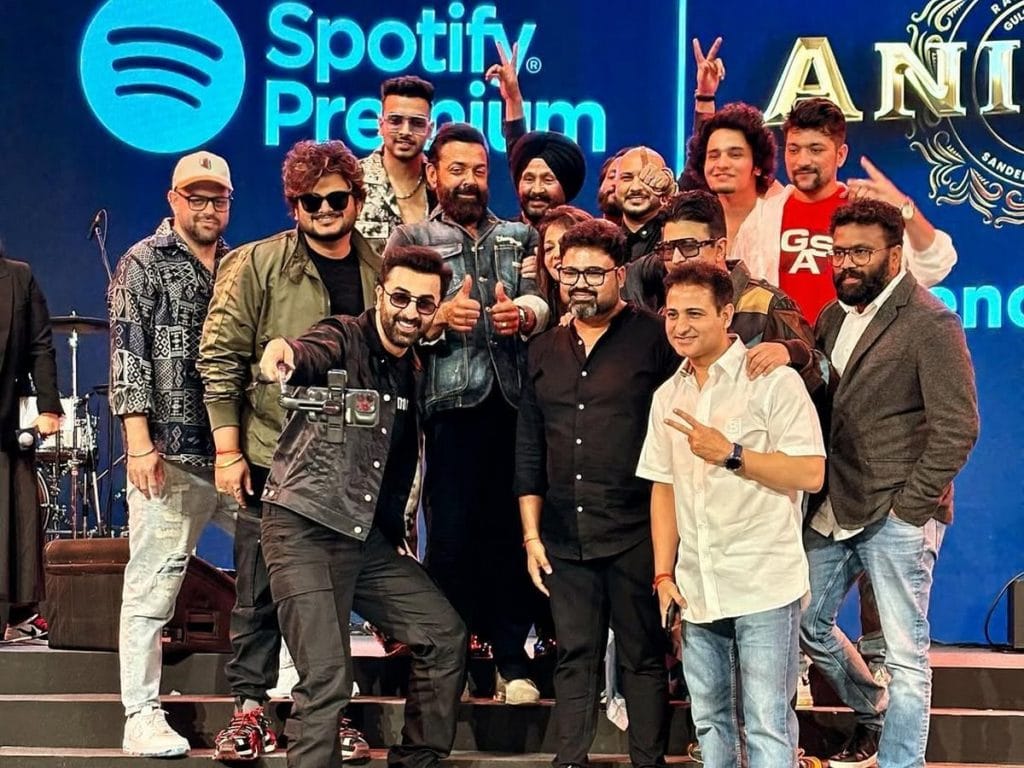New Delhi: If the West has Here Comes the Bride, this wedding season in India belongs to Ishq Hai. Almost every other bride is making her grand, Bollywood-style entrance to its dreamy chorus of ishq hai yeh, ishq hai—this is love, this is love. The man behind the lyrics is Raj Shekhar. From Animal to a Nitish Kumar campaign, he’s written across genres, but he’s now the go-to for modern filmi romance.
The qawwali-style ballad, the theme song of Netflix’s Mismatched Season 3, has been a runaway hit. Sung by Anurag Saikia, it reached Spotify’s No 1 spot after its release in December 2024. Even on Valentine’s Day week this year, it was still the second most-played track. But Ishq Hai isn’t just another viral earworm—it tugs at the heart with its poetic depth.
“Before writing a song, my first thought is always the character who will be lip-syncing it on screen, their backstory,” Shekhar said, speaking in chaste Hindi. “The song doesn’t belong to me, the composer, or even the filmmaker. It belongs to the characters. ” He weighs his words the way he writes his lyrics, carefully and deliberately, with not a syllable wasted.
The year 2024 was a defining one for Shekhar. He was among India’s most-streamed lyricists on Spotify, with 434 million streams and 51 million listeners. He’s also penned a ballad for the upcoming Netflix movie Aap Jaisa Koi, starring R Madhavan and Fatima.

He has a knack for writing songs that stay with people. In Animal, where blood and bullets drowned out almost everything else, Papa Meri Jaan stood apart as a raw, aching tribute to a son’s love for his distant father. Pehle Bhi Main, another hit from the film, became one of 2024’s most beloved love songs. “I would say this movie doesn’t deserve these beautiful songs,” a YouTube commenter wrote.
In an era where most songs fade within an Instagram reel’s lifespan, Shekhar’s lyrics keep finding their way back onto playlists, especially in the romance category. Instead of following a formula, he writes with emotion, making each song an extension of the film’s story.
For Tumbbad, a film about greed, his title track captured the hunger for wealth. In Phir Aayi Haseen Dilruba, the bittersweet Haste Haste played as Rani (Taapsee Pannu) remarries to keep up with the ruse that her husband, Rishu (Vikrant Massey), was dead. Again and again, Shekhar’s lyrics have created the moodboard for a film’s most standout moments. He often brings in an old-world, small-town charm to his songs, a whiff of his upbringing in rural Bihar.
The love story of Dimple (Prajakta Koli) and Rishi (Rohit Saraf) in Mismatched, set in Jaipur, already had a devoted fan base, but Ishq Hai made it even bigger. The song became a hook for self-love reels, wedding videos, and the soundtrack for Gen Z girls’ kurti-clad ‘desi core’ photo shoots. For couples in the first flush of love, nothing signals Reel gravitas and ‘forever’ quite like Ishq Hai playing in the background. The song has over 91 million streams to date and keeps climbing back to the top of the charts.
On YouTube, fans are just as obsessed with the words as they are with the melody. One 130-comment thread dissects the line Saya mera hai tu aur main tera (You are my shadow, and I am yours). “This line sounds similar to O Rangrez’s—mala me aa tujhko pirolu tujhe pehlu sajan… Absolute vibes!” commented a listener. One praised the line Tum se mile toh kuchh gunguni si hone lagi hai sardiyan (Since meeting you, the winter has started warming) as a “banger”. Another declared: “The composer and lyricist deserve as much respect as the singer… this song is pure soul.”
But in his career of nearly 15 years, Shekhar hasn’t always received the credit he’s due. Speaking at the Indian Screenwriters Conference last month he pointed out how often lyricists go unacknowledged.
“Out of 100 songs, 28 to 30 of mine aren’t credited to me,” he said. “That’s just me, but what about others who can’t speak up for their due credit? I urge the audience to find out the name of the lyricist if they like a song. We put in so much passion and hard work.”
Also Read: Bollywood didn’t invest in background scores enough. Naren & Benedict are changing this
Bihar to Bollywood
Raj Shekhar didn’t grow up watching Bollywood song sequences on TV. His family of farmers in Bihar’s Madhepur didn’t own one. But they did have a radio, and that was enough.
“My family had neither television nor electricity. I used to listen to songs on radio, and (the RJs) would ensure names of the lyricists were also shared, and I got to know more about them and the songs they were writing,” said the 37-year-old lyricist.
His love for words also extended to books, and so after school, he headed to Delhi to study Hindi literature at Kirori Mal College. In honour of this journey to the big city, he even swapped the usual Gulzar tracks in his Walkman for Brian Adams.

Fitting in took some time. His English was shaky and his Bihari accent made him stand out.
“I would say ‘sh’ instead of ‘sa’… Also, being a Bihari in Delhi University in 1999 was not easy. The word itself was used as an abuse,” he recalled in a 2017 interview.
Theatre helped him build his confidence. He joined Players, the college’s drama society, where he wrote, directed, and acted in plays while earning both a BA and an MA.
When a bunch of his friends—including Himanshu Sharma, who would later write Tanu Weds Manu, Raanjhanaa, and Atrangi Re—left for Mumbai to try their luck in films, Shekhar went too. He hated it and he soon returned to Delhi to pursue an MPhil.
Then, in 2010, opportunity knocked. He was offered a job as an assistant director on Tanu Weds Manu. By his own admission, he wasn’t great at it and at times earned the ire of director Aanand L Rai. But then something unexpected happened—he became an “accidental lyricist”.
“I was just asked one fine day if I was interested in writing songs, primarily because a few people knew I enjoyed writing. I wrote the dummy lyrics, which later became the lyrics for the film,” he said.

That very day, he came up with the words for what would become Rangrez, the film’s most heart-wrenching song. When Rai read the words, he knew he had found his lyricist.
Shekhar’s input went beyond lyrics, said Himanshu Sharma.
“He gets involved from the very early stage, like in both Tanu Weds Manu and Tanu Weds Manu Returns. He also gives his suggestions at the writing stage, about moments where I should use music in terms of narrative, and that is very helpful,” he added.
The 2011 film was a hit, and so were its songs—including long-drive favourite Yun Hi and the peppy sangeet staple Saadi Gali.
And that’s how it all began. As Shekhar once put it, he went from scribbling songs in buses and trains to writing them in cabs—since he prefers the hum of the city over solitude while working.

“Every song is a story, whether it’s the joy of new love or the anguish of heartbreak,” he said.
Now he is known for romance anthems that speak to millennials and Gen Z. As social media took hold in India, his lyrics became the soundtrack to countless moments—love confessions, breakups, wedding reels.
But his ability to tap into emotion goes beyond film. In 2015, he wrote a campaign song, composed by Sneha Khanwalkar, for Nitish Kumar. One line, Bihar mein bahar ho, Nitish Kumar ho (Let there be spring in Bihar, let there be Nitish Kumar), became the campaign’s catchphrase and has since become evergreen in the state’s election cycles.
Shekhar admires the work of his contemporaries Varun Grover, Amitabh Bhattacharya, and Irshad Kamil, but his heart lies with the greats he grew up on.
“Gulzar’s imagery felt unique. I also liked Shailendra and Sahir Ludhianvi, because their songs would frequently come on radio,” he said.
Filmmaker Tanuja Chandra, who worked with him in the 2017 romantic comedy Qarib Qarib Singlle, describes Shekhar as a poet himself.
“I’m always rooting for Raj. He’s a contemporary poet who has written several hit songs but I do believe there’s an artistic flight of a more distinct beauty that lies ahead,” she said.
Also Read: Bollywood’s new costume king. He’s creating the biggest looks—Gangubai to Pushpa & Manto
The art of writing a hit
There’s no fixed work routine for Raj Shekhar. Some days, he wakes up late. Some days, inspiration strikes at odd hours. At other times, he waits, sitting alone, doing absolutely nothing.
“I do not really have a regular day,” he said. “It depends on what project I am working on, or sometimes even how late I slept the night before. But I do try to spend some dedicated time on my writing desk.”
One constant is cooking. Putting together a good meal and feeding others is therapy for him. When lyrics aren’t flowing, he gets creative in the kitchen.
“I try to go and shop for fresh vegetables in the nearby mandi and cook something. It helps me feel better,” said Shekhar. Once his mind is clear, he sits down to write the next chartbusting song.

For Shekhar, every song starts with the character it’s being pictured on. Some come naturally; others take work. Madamji, Go Easy in Hichki (2018) was one of the trickier ones.
In the film, Rani Mukerji plays a character with Tourette syndrome who starts teaching a group of students from underprivileged backgrounds who’ve been deemed ‘unruly’. It’s these students who teasingly sing to her.
“The characters and their backstory really informs the song. Madamji has been lip-synced by characters who belong to a less-privileged background. Therefore, the song too has come from that place,” said Shekhar.
In Madamji, Go Easy, Shekhar gave almost 100 options before finally cracking the catchphrase: “Madamji, Go Easy. Sab WiFi, hum 3G.”
He pulled from personal experience too.
“I was that student who got distracted while the teacher scribbled on the board,” he chuckled.
The song’s disjointed yet rhyming phrases are a snapshot of scattered thoughts—Vasco da Gama, Columbus ka mama. Ghar na thikana, tiffin se khana.
For Papa Meri Jaan, he drew from his own experience of his relationship with his father.
“We have had songs aplenty about mothers and this was perhaps the first song about a child’s love for his father,” said Shekhar. He focused on how sons often see their fathers as superheroes. Later, he learned that it was Ranbir Kapoor’s favourite song from the film.

Shekhar’s emotional instinct is what director Tanuja Chandra also saw in him. He wrote Jaane De for Qarib Qarib Singlle (2017), a quiet, aching ballad about love and hesitation. The song plays as Irrfan Khan and Parvathy Thiruvothu’s characters stand by the Ganga, questioning whether they should have met at all.
“I loved working with him for Qarib Qarib Singlle and have always felt inclined to have him write lyrics for me, since,” Chandra said. “He was a bit shy when we first interacted but understood I wanted an emotional tone, poetic but not melodramatic. Something real but not timid. He wrote songs that really did that.”
But Shekhar isn’t just about romance. “The more popular song is Jaane De, but Khatam Kahani is feisty and quirky, and I think Raj brought such a sense of fun to the lyrics,” Chandra added.
For Shekhar, the craft is always about blending poetry with storytelling. Some songs need more than just the right words—they need the right language and texture. When a film is set in a particular region or has characters speaking a dialect, he weaves it into the lyrics, whether it’s Marathi or Punjabi.
“It is important to be a reader, to learn more music around you,” he said. “That way, you can honour the words and languages being used for a particular song.”
Bollywood wants hits, but for him, a song has to mean something. It’s a balance he’s still figuring out. While he doesn’t get caught up in streaming numbers and other popularity metrics, the feedback matters.
“All said and done, I like to believe that numbers indicate the love of people, especially those who might not have the language or access to write about why they like a song. Listening on repeat is a way of showing their acceptance and appreciation,” he said. “My goal is to evoke emotions that resonate with audiences on a visceral level.”
(Edited by Asavari Singh)






